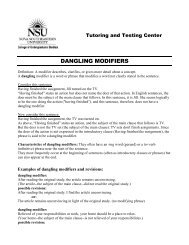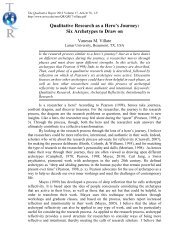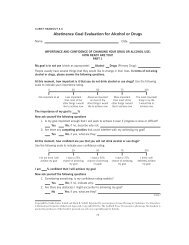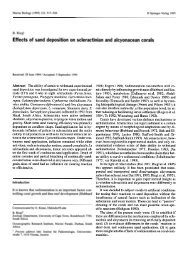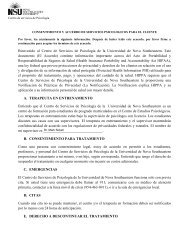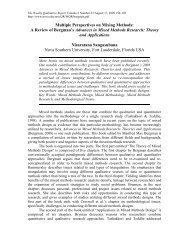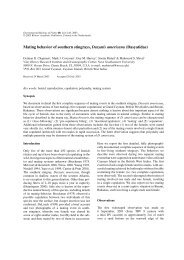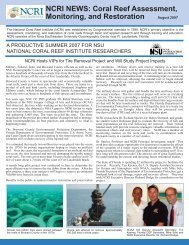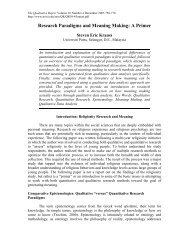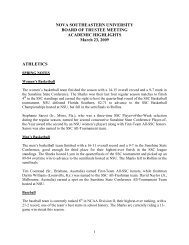Contextualizing Theories and Practices of Bricolage Research
Contextualizing Theories and Practices of Bricolage Research
Contextualizing Theories and Practices of Bricolage Research
You also want an ePaper? Increase the reach of your titles
YUMPU automatically turns print PDFs into web optimized ePapers that Google loves.
Matt Rogers 9<br />
mono-disciplinary approaches that refuse to account for alternative rationalities, multiple<br />
knowledges, or complexities inherent in the inquiry process. Kincheloe sees monological<br />
research as problematic for two reasons: first, it puts constraints around knowledge<br />
production; <strong>and</strong> second, it overlooks dynamics <strong>of</strong> power.<br />
For Kincheloe (2008), monological research problematically examines objects as<br />
things-in-themselves, detached from the socio-historical contexts <strong>of</strong> which they are<br />
constituted. This means, for him, that monological methods are inadequate for studying<br />
educational phenomena. In education, he explains, contexts, relationships, <strong>and</strong> politics all<br />
play complex mediating roles. Similarly, Hyslop-Margison <strong>and</strong> Naseen (2007) describe<br />
positivist research in the following terms:<br />
some logical positivists argue that since the logic <strong>and</strong> processes <strong>of</strong><br />
scientific inquiry are virtually identical regardless <strong>of</strong> the studied<br />
phenomena, no distinction is necessary between the methodological rules<br />
<strong>of</strong> natural <strong>and</strong> social science. Logical positivism focuses primarily on the<br />
observation <strong>and</strong> analysis <strong>of</strong> behaviour as if such analysis could occur in<br />
the absence <strong>of</strong> extraneous normative or contextual considerations. By<br />
adopting such an approach, it attempts to detach human behaviour from<br />
the individual or social circumstance in which it occurred. (p. 21)<br />
For Kincheloe (2004c) this is problematic. In monological research contexts, he explains,<br />
“entities are <strong>of</strong>ten removed from the context that shaped them, the processes <strong>of</strong> which<br />
they are a part, the relationships <strong>and</strong> connections that structure their being in the world”<br />
(p. 74). While a complete underst<strong>and</strong>ing <strong>of</strong> the factors which constitute a phenomenon is<br />
impossible, removing a phenomenon from its context stymies recognition <strong>of</strong> the<br />
multiplicity <strong>of</strong> factors by which it is constituted.<br />
This criticism can be applied to various forms <strong>of</strong> positivist social/educational<br />
research. For example, empirical best-practice educational research focused on proving<br />
that specific teaching strategies have a positive/negative effects on students’ academic<br />
performance can sometimes be monological. To reach a conclusion that a pedagogical<br />
practice is effective or non-effective, some traditional positivist pedagogical<br />
methodologies involve engaging students with a new pedagogical practice <strong>and</strong> having<br />
them take part in st<strong>and</strong>ardized testing procedures before <strong>and</strong> after pedagogical<br />
intervention. The st<strong>and</strong>ardized testing is then used to judge <strong>and</strong> analyze whether or not<br />
students’ results reflect improvement toward a particular st<strong>and</strong>ard. From Kincheloe’s<br />
perspective this form <strong>of</strong> research is monological <strong>and</strong> problematic. <strong>Research</strong>ers’ reliance<br />
on st<strong>and</strong>ardized testing procedures treats objects <strong>of</strong> inquiry (i.e., the students, <strong>and</strong> the<br />
intervention practices) as things-in-themselves. This means that these studies consider<br />
both the students, <strong>and</strong> the practitioners’ pedagogical intervention strategies, detached<br />
from their socio-historical <strong>and</strong> political contexts. Using only a one st<strong>and</strong>ardized testing<br />
procedure, the research does not appreciate the complex dynamics, beyond pedagogical<br />
intervention, that mediate school performance. As Berry (2004a) explains, "the<br />
empiricism <strong>of</strong> using one methodology or even one single theory presents only a partial<br />
answer to the original research question" (p. 105). Although post-structuralist scholars<br />
would argue that all knowledge is partial, in this instance, multi-methodological <strong>and</strong><br />
theoretical approaches could inform researchers <strong>of</strong> the dynamics (e.g., economic, social,



